Analysis of the National Curriculum Framework in Maldives Education
VerifiedAdded on 2020/05/28
|19
|6182
|135
Report
AI Summary
This report provides a comprehensive analysis of the National Curriculum Framework in Maldives. It begins with an overview of the historical context of the education system, including the transition from traditional schooling to a more westernized approach. The report then delves into the specifics of the new curriculum framework, highlighting the shift towards an outcome-based approach that emphasizes skills, values, and attitudes. It examines the mechanisms of curriculum development, the changes implemented, and the efforts made to facilitate these changes. Furthermore, the report discusses the challenges encountered during implementation, such as the need for pedagogical reform, government support, and stakeholder communication. Finally, it offers recommendations to overcome these challenges, contributing to the improvement of education quality in Maldives. The report also emphasizes the importance of training, ethical frameworks and communication to ensure the successful implementation of the new curriculum framework. This analysis is valuable for understanding the evolution and current state of education in the Maldives.
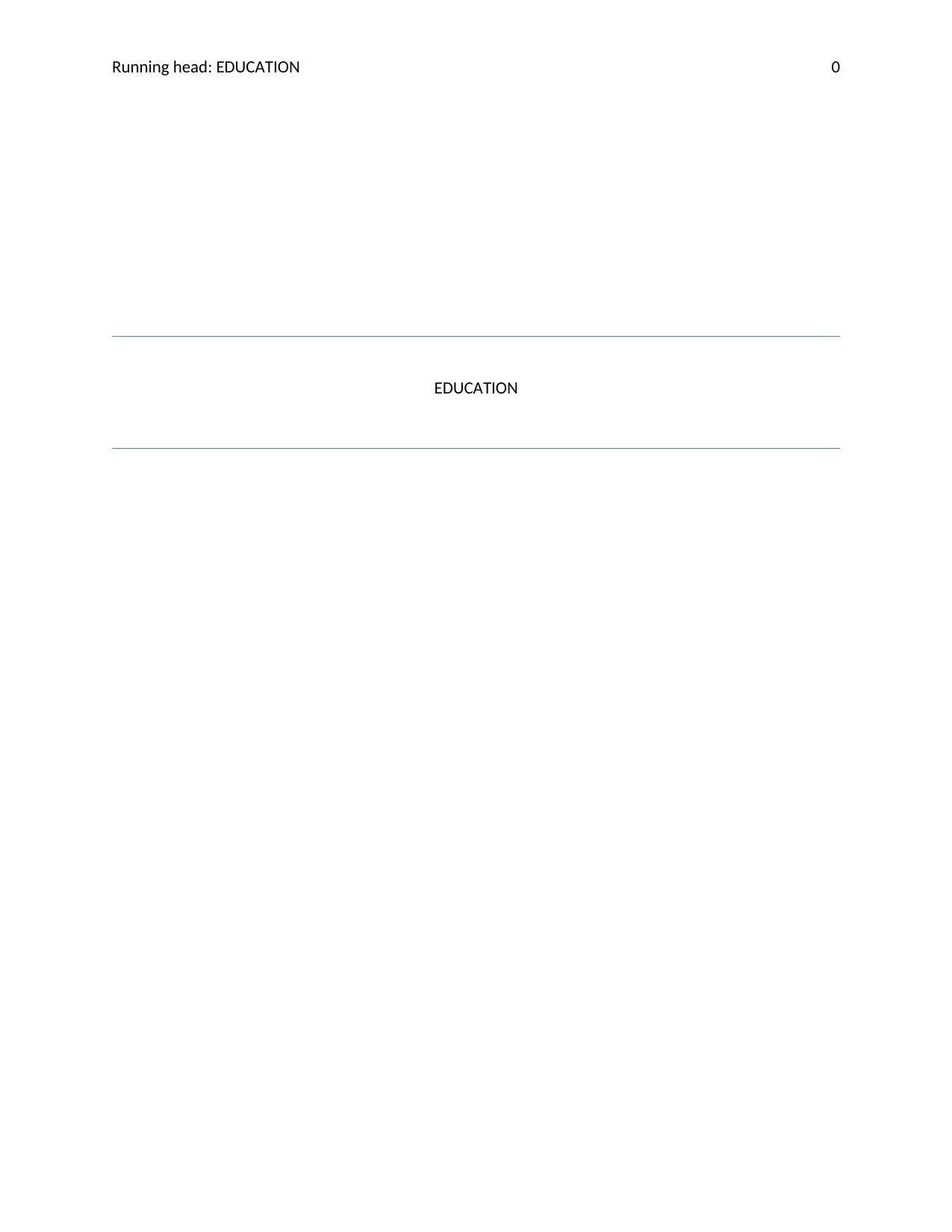
Running head: EDUCATION 0
EDUCATION
EDUCATION
Paraphrase This Document
Need a fresh take? Get an instant paraphrase of this document with our AI Paraphraser
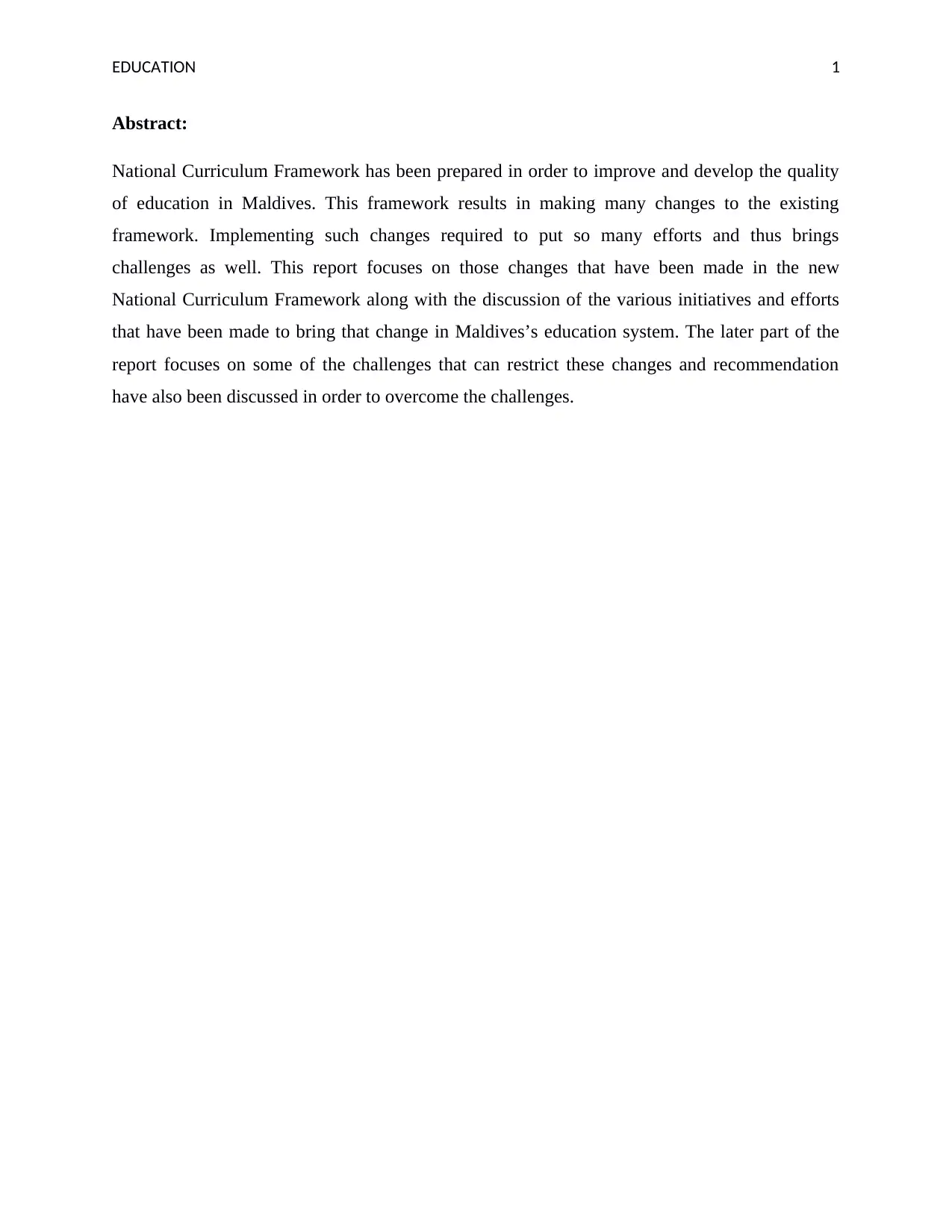
EDUCATION 1
Abstract:
National Curriculum Framework has been prepared in order to improve and develop the quality
of education in Maldives. This framework results in making many changes to the existing
framework. Implementing such changes required to put so many efforts and thus brings
challenges as well. This report focuses on those changes that have been made in the new
National Curriculum Framework along with the discussion of the various initiatives and efforts
that have been made to bring that change in Maldives’s education system. The later part of the
report focuses on some of the challenges that can restrict these changes and recommendation
have also been discussed in order to overcome the challenges.
Abstract:
National Curriculum Framework has been prepared in order to improve and develop the quality
of education in Maldives. This framework results in making many changes to the existing
framework. Implementing such changes required to put so many efforts and thus brings
challenges as well. This report focuses on those changes that have been made in the new
National Curriculum Framework along with the discussion of the various initiatives and efforts
that have been made to bring that change in Maldives’s education system. The later part of the
report focuses on some of the challenges that can restrict these changes and recommendation
have also been discussed in order to overcome the challenges.
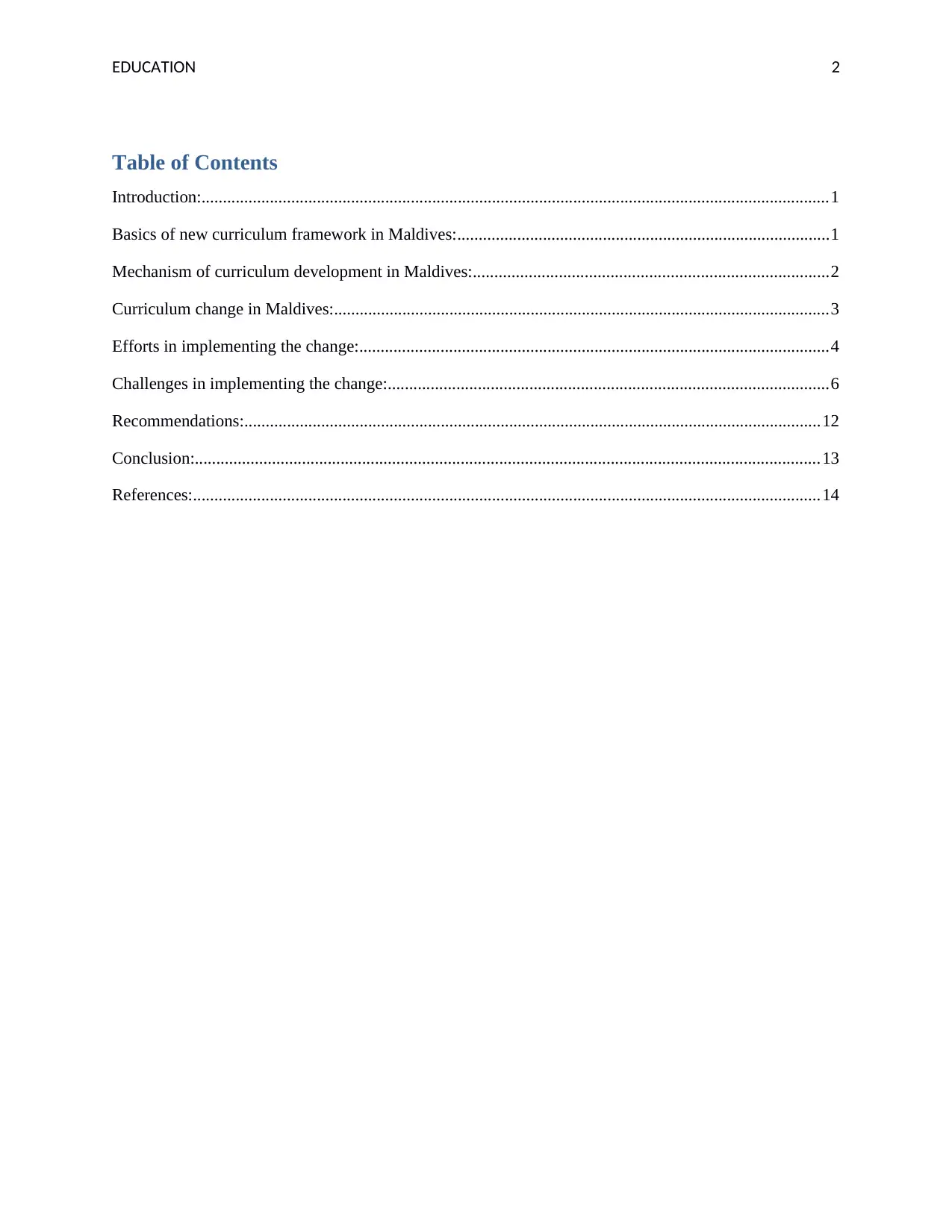
EDUCATION 2
Table of Contents
Introduction:...................................................................................................................................................1
Basics of new curriculum framework in Maldives:.......................................................................................1
Mechanism of curriculum development in Maldives:...................................................................................2
Curriculum change in Maldives:....................................................................................................................3
Efforts in implementing the change:..............................................................................................................4
Challenges in implementing the change:.......................................................................................................6
Recommendations:.......................................................................................................................................12
Conclusion:..................................................................................................................................................13
References:...................................................................................................................................................14
Table of Contents
Introduction:...................................................................................................................................................1
Basics of new curriculum framework in Maldives:.......................................................................................1
Mechanism of curriculum development in Maldives:...................................................................................2
Curriculum change in Maldives:....................................................................................................................3
Efforts in implementing the change:..............................................................................................................4
Challenges in implementing the change:.......................................................................................................6
Recommendations:.......................................................................................................................................12
Conclusion:..................................................................................................................................................13
References:...................................................................................................................................................14
⊘ This is a preview!⊘
Do you want full access?
Subscribe today to unlock all pages.

Trusted by 1+ million students worldwide
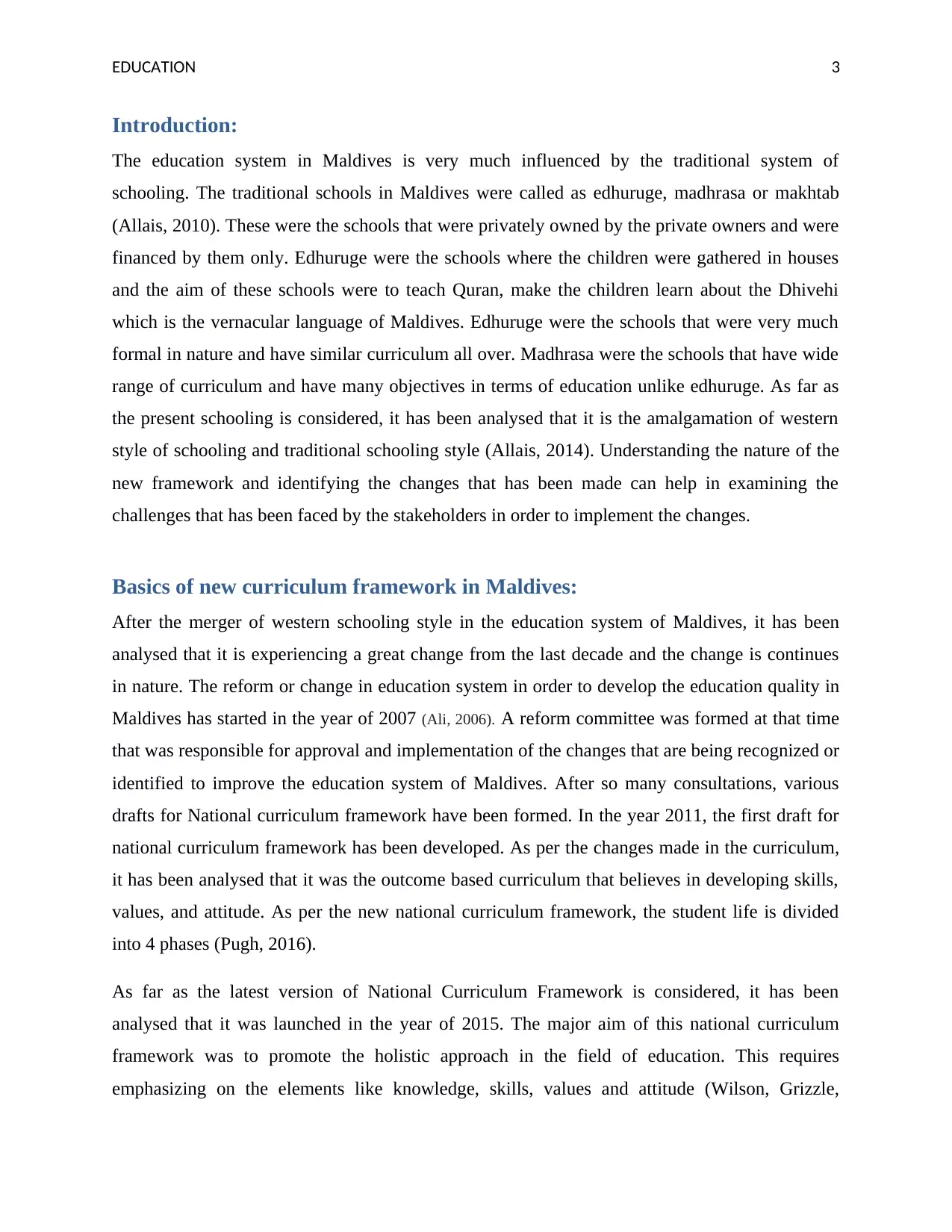
EDUCATION 3
Introduction:
The education system in Maldives is very much influenced by the traditional system of
schooling. The traditional schools in Maldives were called as edhuruge, madhrasa or makhtab
(Allais, 2010). These were the schools that were privately owned by the private owners and were
financed by them only. Edhuruge were the schools where the children were gathered in houses
and the aim of these schools were to teach Quran, make the children learn about the Dhivehi
which is the vernacular language of Maldives. Edhuruge were the schools that were very much
formal in nature and have similar curriculum all over. Madhrasa were the schools that have wide
range of curriculum and have many objectives in terms of education unlike edhuruge. As far as
the present schooling is considered, it has been analysed that it is the amalgamation of western
style of schooling and traditional schooling style (Allais, 2014). Understanding the nature of the
new framework and identifying the changes that has been made can help in examining the
challenges that has been faced by the stakeholders in order to implement the changes.
Basics of new curriculum framework in Maldives:
After the merger of western schooling style in the education system of Maldives, it has been
analysed that it is experiencing a great change from the last decade and the change is continues
in nature. The reform or change in education system in order to develop the education quality in
Maldives has started in the year of 2007 (Ali, 2006). A reform committee was formed at that time
that was responsible for approval and implementation of the changes that are being recognized or
identified to improve the education system of Maldives. After so many consultations, various
drafts for National curriculum framework have been formed. In the year 2011, the first draft for
national curriculum framework has been developed. As per the changes made in the curriculum,
it has been analysed that it was the outcome based curriculum that believes in developing skills,
values, and attitude. As per the new national curriculum framework, the student life is divided
into 4 phases (Pugh, 2016).
As far as the latest version of National Curriculum Framework is considered, it has been
analysed that it was launched in the year of 2015. The major aim of this national curriculum
framework was to promote the holistic approach in the field of education. This requires
emphasizing on the elements like knowledge, skills, values and attitude (Wilson, Grizzle,
Introduction:
The education system in Maldives is very much influenced by the traditional system of
schooling. The traditional schools in Maldives were called as edhuruge, madhrasa or makhtab
(Allais, 2010). These were the schools that were privately owned by the private owners and were
financed by them only. Edhuruge were the schools where the children were gathered in houses
and the aim of these schools were to teach Quran, make the children learn about the Dhivehi
which is the vernacular language of Maldives. Edhuruge were the schools that were very much
formal in nature and have similar curriculum all over. Madhrasa were the schools that have wide
range of curriculum and have many objectives in terms of education unlike edhuruge. As far as
the present schooling is considered, it has been analysed that it is the amalgamation of western
style of schooling and traditional schooling style (Allais, 2014). Understanding the nature of the
new framework and identifying the changes that has been made can help in examining the
challenges that has been faced by the stakeholders in order to implement the changes.
Basics of new curriculum framework in Maldives:
After the merger of western schooling style in the education system of Maldives, it has been
analysed that it is experiencing a great change from the last decade and the change is continues
in nature. The reform or change in education system in order to develop the education quality in
Maldives has started in the year of 2007 (Ali, 2006). A reform committee was formed at that time
that was responsible for approval and implementation of the changes that are being recognized or
identified to improve the education system of Maldives. After so many consultations, various
drafts for National curriculum framework have been formed. In the year 2011, the first draft for
national curriculum framework has been developed. As per the changes made in the curriculum,
it has been analysed that it was the outcome based curriculum that believes in developing skills,
values, and attitude. As per the new national curriculum framework, the student life is divided
into 4 phases (Pugh, 2016).
As far as the latest version of National Curriculum Framework is considered, it has been
analysed that it was launched in the year of 2015. The major aim of this national curriculum
framework was to promote the holistic approach in the field of education. This requires
emphasizing on the elements like knowledge, skills, values and attitude (Wilson, Grizzle,
Paraphrase This Document
Need a fresh take? Get an instant paraphrase of this document with our AI Paraphraser
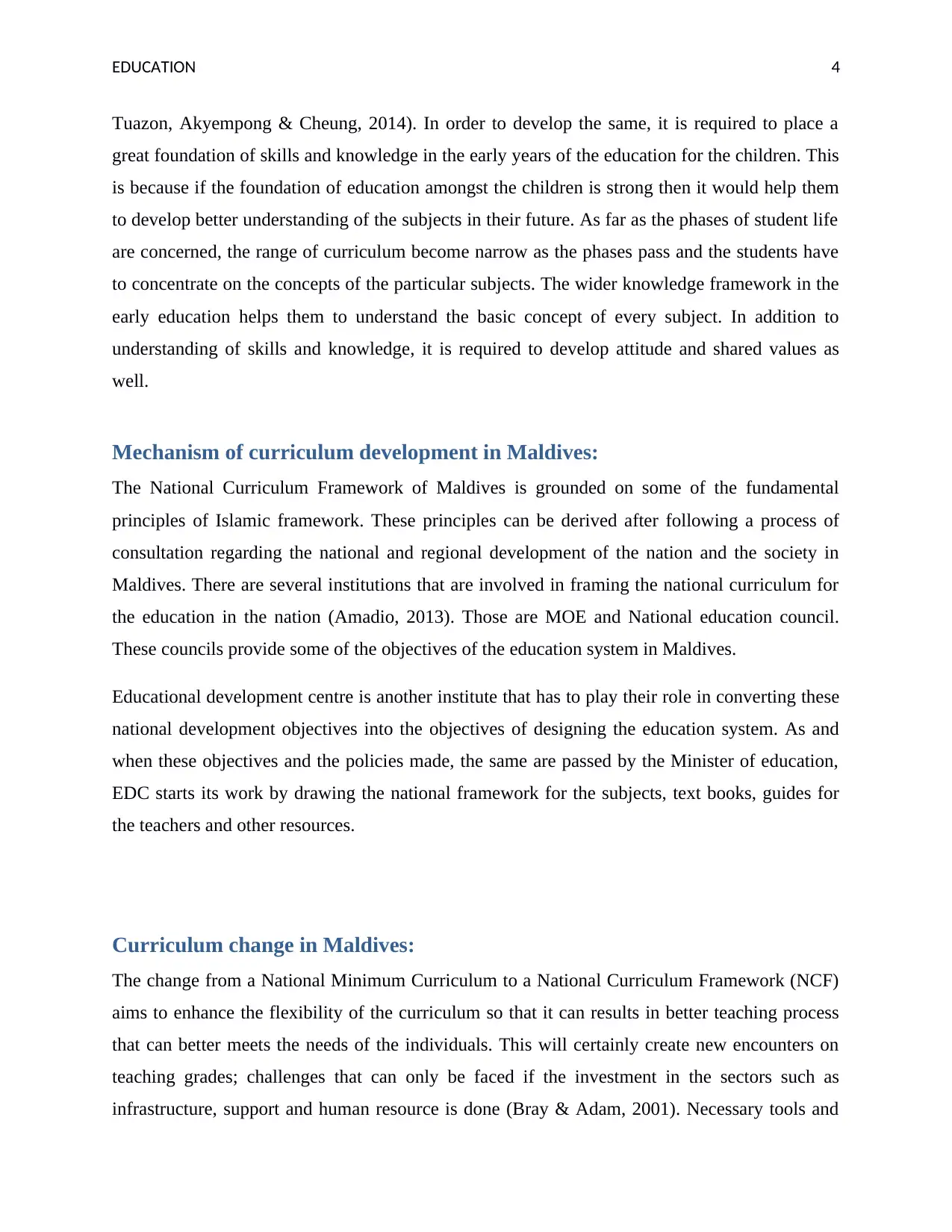
EDUCATION 4
Tuazon, Akyempong & Cheung, 2014). In order to develop the same, it is required to place a
great foundation of skills and knowledge in the early years of the education for the children. This
is because if the foundation of education amongst the children is strong then it would help them
to develop better understanding of the subjects in their future. As far as the phases of student life
are concerned, the range of curriculum become narrow as the phases pass and the students have
to concentrate on the concepts of the particular subjects. The wider knowledge framework in the
early education helps them to understand the basic concept of every subject. In addition to
understanding of skills and knowledge, it is required to develop attitude and shared values as
well.
Mechanism of curriculum development in Maldives:
The National Curriculum Framework of Maldives is grounded on some of the fundamental
principles of Islamic framework. These principles can be derived after following a process of
consultation regarding the national and regional development of the nation and the society in
Maldives. There are several institutions that are involved in framing the national curriculum for
the education in the nation (Amadio, 2013). Those are MOE and National education council.
These councils provide some of the objectives of the education system in Maldives.
Educational development centre is another institute that has to play their role in converting these
national development objectives into the objectives of designing the education system. As and
when these objectives and the policies made, the same are passed by the Minister of education,
EDC starts its work by drawing the national framework for the subjects, text books, guides for
the teachers and other resources.
Curriculum change in Maldives:
The change from a National Minimum Curriculum to a National Curriculum Framework (NCF)
aims to enhance the flexibility of the curriculum so that it can results in better teaching process
that can better meets the needs of the individuals. This will certainly create new encounters on
teaching grades; challenges that can only be faced if the investment in the sectors such as
infrastructure, support and human resource is done (Bray & Adam, 2001). Necessary tools and
Tuazon, Akyempong & Cheung, 2014). In order to develop the same, it is required to place a
great foundation of skills and knowledge in the early years of the education for the children. This
is because if the foundation of education amongst the children is strong then it would help them
to develop better understanding of the subjects in their future. As far as the phases of student life
are concerned, the range of curriculum become narrow as the phases pass and the students have
to concentrate on the concepts of the particular subjects. The wider knowledge framework in the
early education helps them to understand the basic concept of every subject. In addition to
understanding of skills and knowledge, it is required to develop attitude and shared values as
well.
Mechanism of curriculum development in Maldives:
The National Curriculum Framework of Maldives is grounded on some of the fundamental
principles of Islamic framework. These principles can be derived after following a process of
consultation regarding the national and regional development of the nation and the society in
Maldives. There are several institutions that are involved in framing the national curriculum for
the education in the nation (Amadio, 2013). Those are MOE and National education council.
These councils provide some of the objectives of the education system in Maldives.
Educational development centre is another institute that has to play their role in converting these
national development objectives into the objectives of designing the education system. As and
when these objectives and the policies made, the same are passed by the Minister of education,
EDC starts its work by drawing the national framework for the subjects, text books, guides for
the teachers and other resources.
Curriculum change in Maldives:
The change from a National Minimum Curriculum to a National Curriculum Framework (NCF)
aims to enhance the flexibility of the curriculum so that it can results in better teaching process
that can better meets the needs of the individuals. This will certainly create new encounters on
teaching grades; challenges that can only be faced if the investment in the sectors such as
infrastructure, support and human resource is done (Bray & Adam, 2001). Necessary tools and
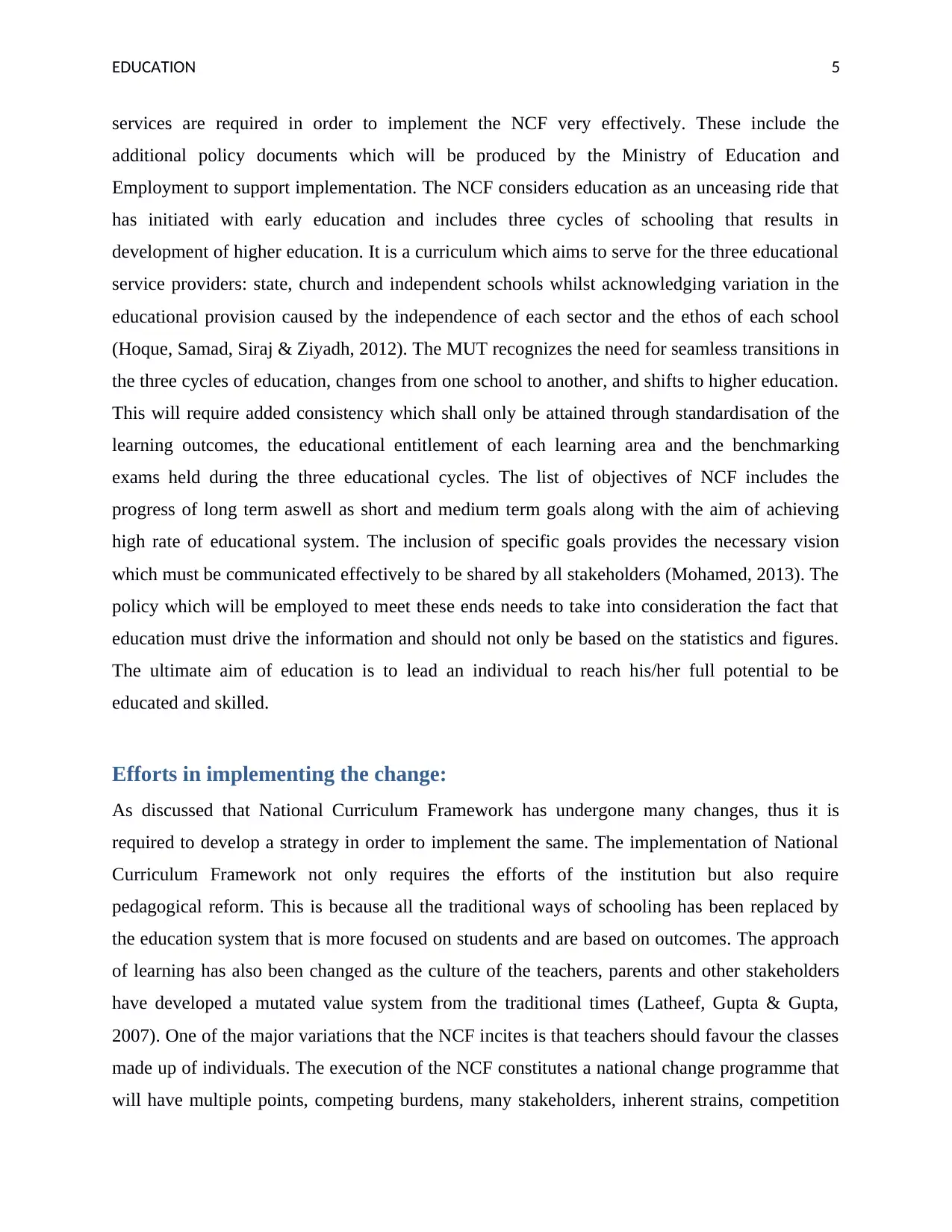
EDUCATION 5
services are required in order to implement the NCF very effectively. These include the
additional policy documents which will be produced by the Ministry of Education and
Employment to support implementation. The NCF considers education as an unceasing ride that
has initiated with early education and includes three cycles of schooling that results in
development of higher education. It is a curriculum which aims to serve for the three educational
service providers: state, church and independent schools whilst acknowledging variation in the
educational provision caused by the independence of each sector and the ethos of each school
(Hoque, Samad, Siraj & Ziyadh, 2012). The MUT recognizes the need for seamless transitions in
the three cycles of education, changes from one school to another, and shifts to higher education.
This will require added consistency which shall only be attained through standardisation of the
learning outcomes, the educational entitlement of each learning area and the benchmarking
exams held during the three educational cycles. The list of objectives of NCF includes the
progress of long term aswell as short and medium term goals along with the aim of achieving
high rate of educational system. The inclusion of specific goals provides the necessary vision
which must be communicated effectively to be shared by all stakeholders (Mohamed, 2013). The
policy which will be employed to meet these ends needs to take into consideration the fact that
education must drive the information and should not only be based on the statistics and figures.
The ultimate aim of education is to lead an individual to reach his/her full potential to be
educated and skilled.
Efforts in implementing the change:
As discussed that National Curriculum Framework has undergone many changes, thus it is
required to develop a strategy in order to implement the same. The implementation of National
Curriculum Framework not only requires the efforts of the institution but also require
pedagogical reform. This is because all the traditional ways of schooling has been replaced by
the education system that is more focused on students and are based on outcomes. The approach
of learning has also been changed as the culture of the teachers, parents and other stakeholders
have developed a mutated value system from the traditional times (Latheef, Gupta & Gupta,
2007). One of the major variations that the NCF incites is that teachers should favour the classes
made up of individuals. The execution of the NCF constitutes a national change programme that
will have multiple points, competing burdens, many stakeholders, inherent strains, competition
services are required in order to implement the NCF very effectively. These include the
additional policy documents which will be produced by the Ministry of Education and
Employment to support implementation. The NCF considers education as an unceasing ride that
has initiated with early education and includes three cycles of schooling that results in
development of higher education. It is a curriculum which aims to serve for the three educational
service providers: state, church and independent schools whilst acknowledging variation in the
educational provision caused by the independence of each sector and the ethos of each school
(Hoque, Samad, Siraj & Ziyadh, 2012). The MUT recognizes the need for seamless transitions in
the three cycles of education, changes from one school to another, and shifts to higher education.
This will require added consistency which shall only be attained through standardisation of the
learning outcomes, the educational entitlement of each learning area and the benchmarking
exams held during the three educational cycles. The list of objectives of NCF includes the
progress of long term aswell as short and medium term goals along with the aim of achieving
high rate of educational system. The inclusion of specific goals provides the necessary vision
which must be communicated effectively to be shared by all stakeholders (Mohamed, 2013). The
policy which will be employed to meet these ends needs to take into consideration the fact that
education must drive the information and should not only be based on the statistics and figures.
The ultimate aim of education is to lead an individual to reach his/her full potential to be
educated and skilled.
Efforts in implementing the change:
As discussed that National Curriculum Framework has undergone many changes, thus it is
required to develop a strategy in order to implement the same. The implementation of National
Curriculum Framework not only requires the efforts of the institution but also require
pedagogical reform. This is because all the traditional ways of schooling has been replaced by
the education system that is more focused on students and are based on outcomes. The approach
of learning has also been changed as the culture of the teachers, parents and other stakeholders
have developed a mutated value system from the traditional times (Latheef, Gupta & Gupta,
2007). One of the major variations that the NCF incites is that teachers should favour the classes
made up of individuals. The execution of the NCF constitutes a national change programme that
will have multiple points, competing burdens, many stakeholders, inherent strains, competition
⊘ This is a preview!⊘
Do you want full access?
Subscribe today to unlock all pages.

Trusted by 1+ million students worldwide
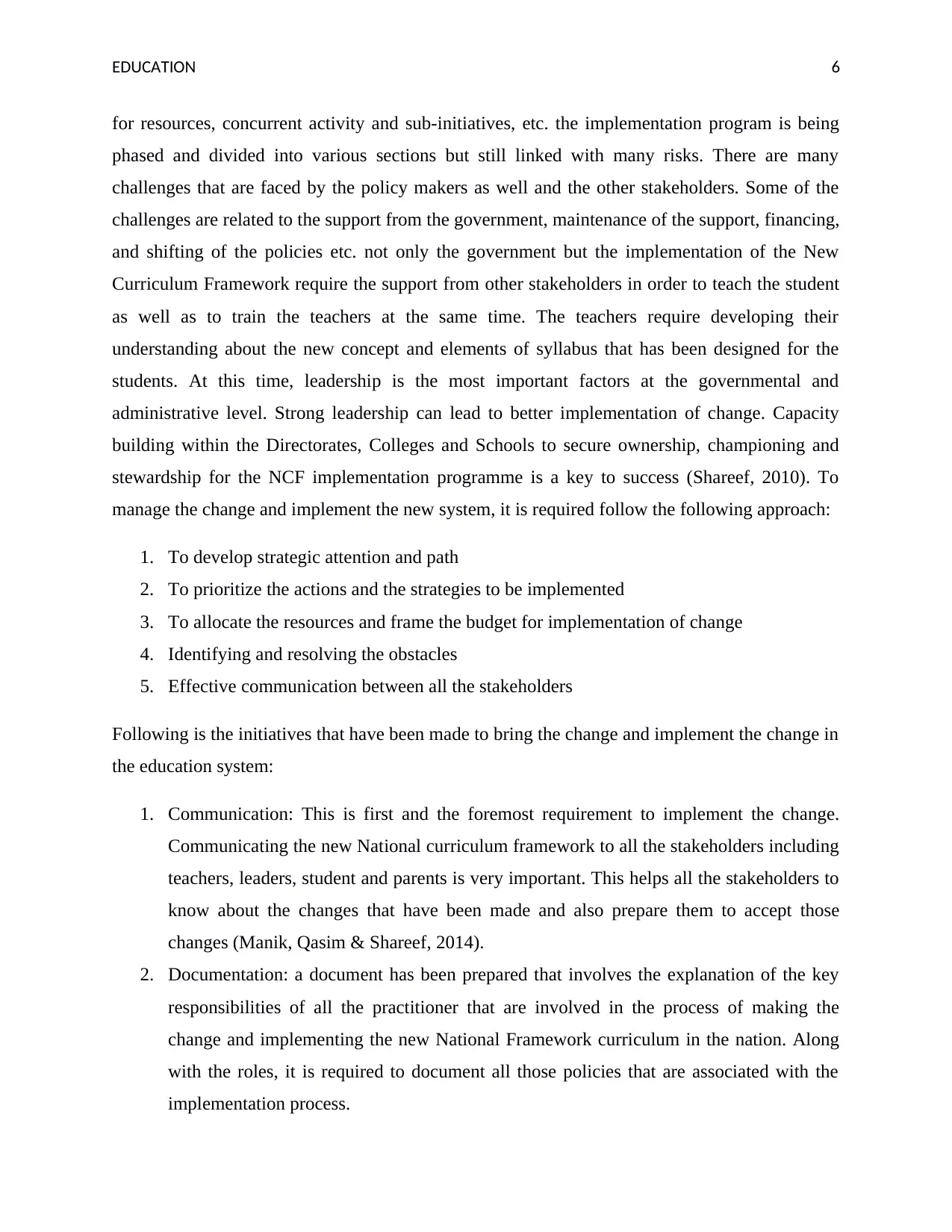
EDUCATION 6
for resources, concurrent activity and sub-initiatives, etc. the implementation program is being
phased and divided into various sections but still linked with many risks. There are many
challenges that are faced by the policy makers as well and the other stakeholders. Some of the
challenges are related to the support from the government, maintenance of the support, financing,
and shifting of the policies etc. not only the government but the implementation of the New
Curriculum Framework require the support from other stakeholders in order to teach the student
as well as to train the teachers at the same time. The teachers require developing their
understanding about the new concept and elements of syllabus that has been designed for the
students. At this time, leadership is the most important factors at the governmental and
administrative level. Strong leadership can lead to better implementation of change. Capacity
building within the Directorates, Colleges and Schools to secure ownership, championing and
stewardship for the NCF implementation programme is a key to success (Shareef, 2010). To
manage the change and implement the new system, it is required follow the following approach:
1. To develop strategic attention and path
2. To prioritize the actions and the strategies to be implemented
3. To allocate the resources and frame the budget for implementation of change
4. Identifying and resolving the obstacles
5. Effective communication between all the stakeholders
Following is the initiatives that have been made to bring the change and implement the change in
the education system:
1. Communication: This is first and the foremost requirement to implement the change.
Communicating the new National curriculum framework to all the stakeholders including
teachers, leaders, student and parents is very important. This helps all the stakeholders to
know about the changes that have been made and also prepare them to accept those
changes (Manik, Qasim & Shareef, 2014).
2. Documentation: a document has been prepared that involves the explanation of the key
responsibilities of all the practitioner that are involved in the process of making the
change and implementing the new National Framework curriculum in the nation. Along
with the roles, it is required to document all those policies that are associated with the
implementation process.
for resources, concurrent activity and sub-initiatives, etc. the implementation program is being
phased and divided into various sections but still linked with many risks. There are many
challenges that are faced by the policy makers as well and the other stakeholders. Some of the
challenges are related to the support from the government, maintenance of the support, financing,
and shifting of the policies etc. not only the government but the implementation of the New
Curriculum Framework require the support from other stakeholders in order to teach the student
as well as to train the teachers at the same time. The teachers require developing their
understanding about the new concept and elements of syllabus that has been designed for the
students. At this time, leadership is the most important factors at the governmental and
administrative level. Strong leadership can lead to better implementation of change. Capacity
building within the Directorates, Colleges and Schools to secure ownership, championing and
stewardship for the NCF implementation programme is a key to success (Shareef, 2010). To
manage the change and implement the new system, it is required follow the following approach:
1. To develop strategic attention and path
2. To prioritize the actions and the strategies to be implemented
3. To allocate the resources and frame the budget for implementation of change
4. Identifying and resolving the obstacles
5. Effective communication between all the stakeholders
Following is the initiatives that have been made to bring the change and implement the change in
the education system:
1. Communication: This is first and the foremost requirement to implement the change.
Communicating the new National curriculum framework to all the stakeholders including
teachers, leaders, student and parents is very important. This helps all the stakeholders to
know about the changes that have been made and also prepare them to accept those
changes (Manik, Qasim & Shareef, 2014).
2. Documentation: a document has been prepared that involves the explanation of the key
responsibilities of all the practitioner that are involved in the process of making the
change and implementing the new National Framework curriculum in the nation. Along
with the roles, it is required to document all those policies that are associated with the
implementation process.
Paraphrase This Document
Need a fresh take? Get an instant paraphrase of this document with our AI Paraphraser
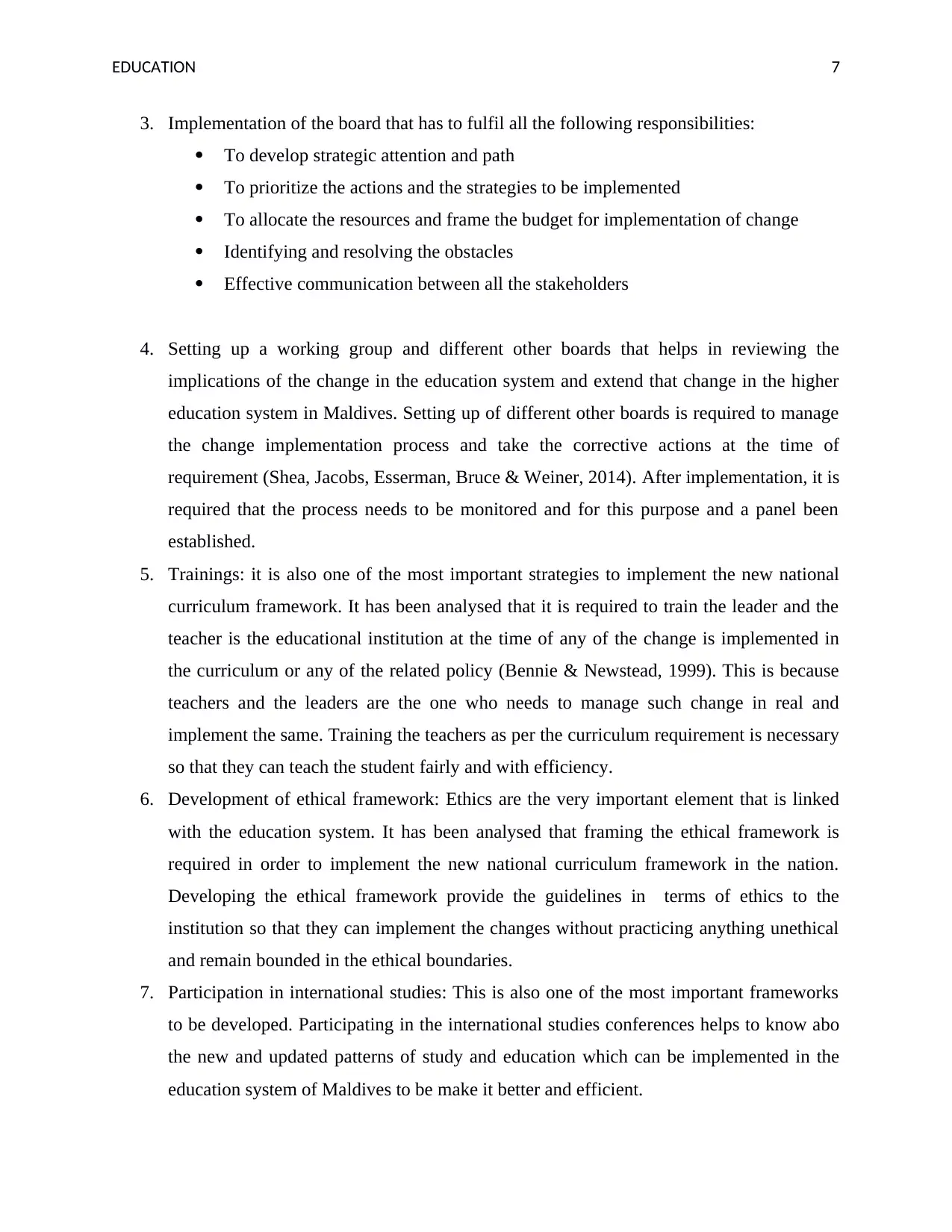
EDUCATION 7
3. Implementation of the board that has to fulfil all the following responsibilities:
To develop strategic attention and path
To prioritize the actions and the strategies to be implemented
To allocate the resources and frame the budget for implementation of change
Identifying and resolving the obstacles
Effective communication between all the stakeholders
4. Setting up a working group and different other boards that helps in reviewing the
implications of the change in the education system and extend that change in the higher
education system in Maldives. Setting up of different other boards is required to manage
the change implementation process and take the corrective actions at the time of
requirement (Shea, Jacobs, Esserman, Bruce & Weiner, 2014). After implementation, it is
required that the process needs to be monitored and for this purpose and a panel been
established.
5. Trainings: it is also one of the most important strategies to implement the new national
curriculum framework. It has been analysed that it is required to train the leader and the
teacher is the educational institution at the time of any of the change is implemented in
the curriculum or any of the related policy (Bennie & Newstead, 1999). This is because
teachers and the leaders are the one who needs to manage such change in real and
implement the same. Training the teachers as per the curriculum requirement is necessary
so that they can teach the student fairly and with efficiency.
6. Development of ethical framework: Ethics are the very important element that is linked
with the education system. It has been analysed that framing the ethical framework is
required in order to implement the new national curriculum framework in the nation.
Developing the ethical framework provide the guidelines in terms of ethics to the
institution so that they can implement the changes without practicing anything unethical
and remain bounded in the ethical boundaries.
7. Participation in international studies: This is also one of the most important frameworks
to be developed. Participating in the international studies conferences helps to know abo
the new and updated patterns of study and education which can be implemented in the
education system of Maldives to be make it better and efficient.
3. Implementation of the board that has to fulfil all the following responsibilities:
To develop strategic attention and path
To prioritize the actions and the strategies to be implemented
To allocate the resources and frame the budget for implementation of change
Identifying and resolving the obstacles
Effective communication between all the stakeholders
4. Setting up a working group and different other boards that helps in reviewing the
implications of the change in the education system and extend that change in the higher
education system in Maldives. Setting up of different other boards is required to manage
the change implementation process and take the corrective actions at the time of
requirement (Shea, Jacobs, Esserman, Bruce & Weiner, 2014). After implementation, it is
required that the process needs to be monitored and for this purpose and a panel been
established.
5. Trainings: it is also one of the most important strategies to implement the new national
curriculum framework. It has been analysed that it is required to train the leader and the
teacher is the educational institution at the time of any of the change is implemented in
the curriculum or any of the related policy (Bennie & Newstead, 1999). This is because
teachers and the leaders are the one who needs to manage such change in real and
implement the same. Training the teachers as per the curriculum requirement is necessary
so that they can teach the student fairly and with efficiency.
6. Development of ethical framework: Ethics are the very important element that is linked
with the education system. It has been analysed that framing the ethical framework is
required in order to implement the new national curriculum framework in the nation.
Developing the ethical framework provide the guidelines in terms of ethics to the
institution so that they can implement the changes without practicing anything unethical
and remain bounded in the ethical boundaries.
7. Participation in international studies: This is also one of the most important frameworks
to be developed. Participating in the international studies conferences helps to know abo
the new and updated patterns of study and education which can be implemented in the
education system of Maldives to be make it better and efficient.
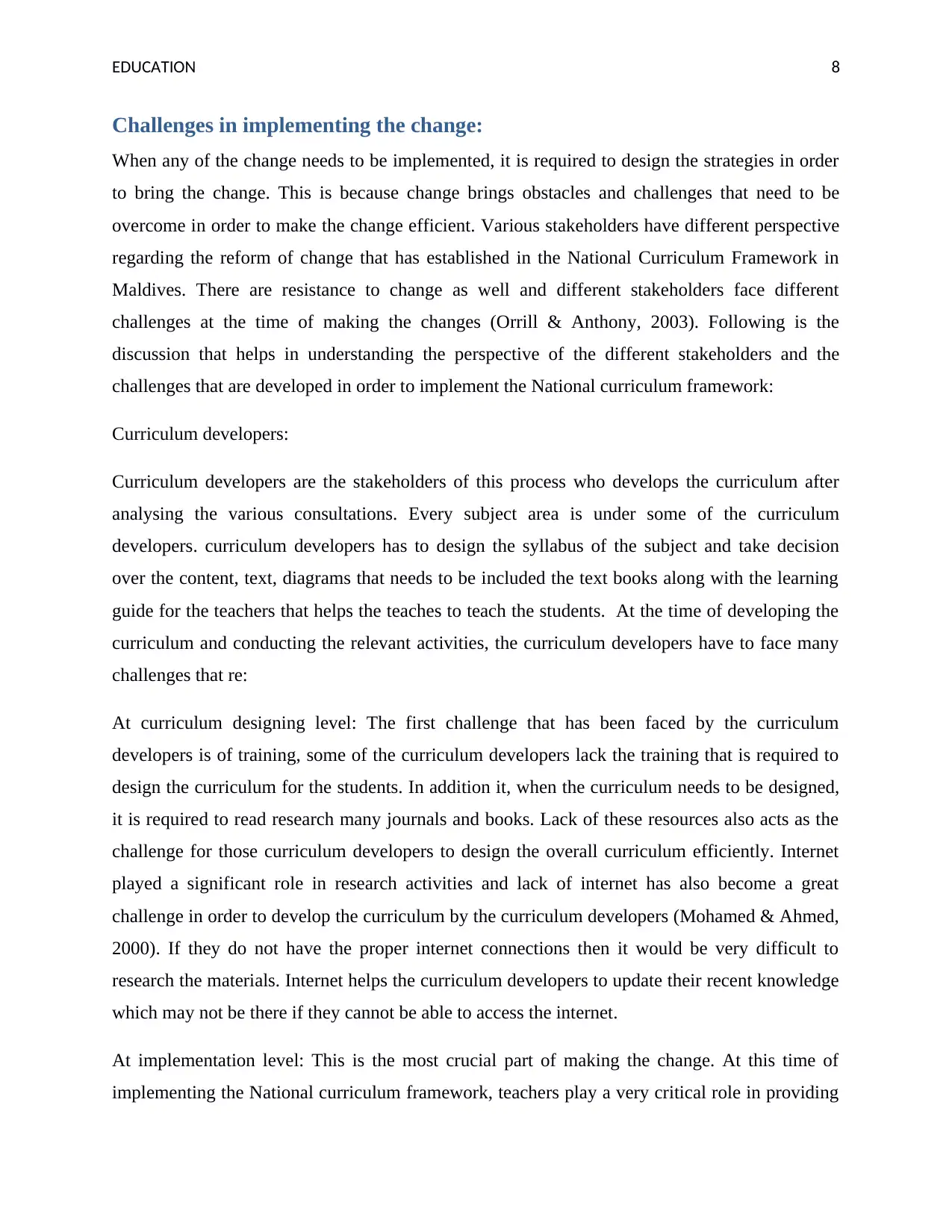
EDUCATION 8
Challenges in implementing the change:
When any of the change needs to be implemented, it is required to design the strategies in order
to bring the change. This is because change brings obstacles and challenges that need to be
overcome in order to make the change efficient. Various stakeholders have different perspective
regarding the reform of change that has established in the National Curriculum Framework in
Maldives. There are resistance to change as well and different stakeholders face different
challenges at the time of making the changes (Orrill & Anthony, 2003). Following is the
discussion that helps in understanding the perspective of the different stakeholders and the
challenges that are developed in order to implement the National curriculum framework:
Curriculum developers:
Curriculum developers are the stakeholders of this process who develops the curriculum after
analysing the various consultations. Every subject area is under some of the curriculum
developers. curriculum developers has to design the syllabus of the subject and take decision
over the content, text, diagrams that needs to be included the text books along with the learning
guide for the teachers that helps the teaches to teach the students. At the time of developing the
curriculum and conducting the relevant activities, the curriculum developers have to face many
challenges that re:
At curriculum designing level: The first challenge that has been faced by the curriculum
developers is of training, some of the curriculum developers lack the training that is required to
design the curriculum for the students. In addition it, when the curriculum needs to be designed,
it is required to read research many journals and books. Lack of these resources also acts as the
challenge for those curriculum developers to design the overall curriculum efficiently. Internet
played a significant role in research activities and lack of internet has also become a great
challenge in order to develop the curriculum by the curriculum developers (Mohamed & Ahmed,
2000). If they do not have the proper internet connections then it would be very difficult to
research the materials. Internet helps the curriculum developers to update their recent knowledge
which may not be there if they cannot be able to access the internet.
At implementation level: This is the most crucial part of making the change. At this time of
implementing the National curriculum framework, teachers play a very critical role in providing
Challenges in implementing the change:
When any of the change needs to be implemented, it is required to design the strategies in order
to bring the change. This is because change brings obstacles and challenges that need to be
overcome in order to make the change efficient. Various stakeholders have different perspective
regarding the reform of change that has established in the National Curriculum Framework in
Maldives. There are resistance to change as well and different stakeholders face different
challenges at the time of making the changes (Orrill & Anthony, 2003). Following is the
discussion that helps in understanding the perspective of the different stakeholders and the
challenges that are developed in order to implement the National curriculum framework:
Curriculum developers:
Curriculum developers are the stakeholders of this process who develops the curriculum after
analysing the various consultations. Every subject area is under some of the curriculum
developers. curriculum developers has to design the syllabus of the subject and take decision
over the content, text, diagrams that needs to be included the text books along with the learning
guide for the teachers that helps the teaches to teach the students. At the time of developing the
curriculum and conducting the relevant activities, the curriculum developers have to face many
challenges that re:
At curriculum designing level: The first challenge that has been faced by the curriculum
developers is of training, some of the curriculum developers lack the training that is required to
design the curriculum for the students. In addition it, when the curriculum needs to be designed,
it is required to read research many journals and books. Lack of these resources also acts as the
challenge for those curriculum developers to design the overall curriculum efficiently. Internet
played a significant role in research activities and lack of internet has also become a great
challenge in order to develop the curriculum by the curriculum developers (Mohamed & Ahmed,
2000). If they do not have the proper internet connections then it would be very difficult to
research the materials. Internet helps the curriculum developers to update their recent knowledge
which may not be there if they cannot be able to access the internet.
At implementation level: This is the most crucial part of making the change. At this time of
implementing the National curriculum framework, teachers play a very critical role in providing
⊘ This is a preview!⊘
Do you want full access?
Subscribe today to unlock all pages.

Trusted by 1+ million students worldwide
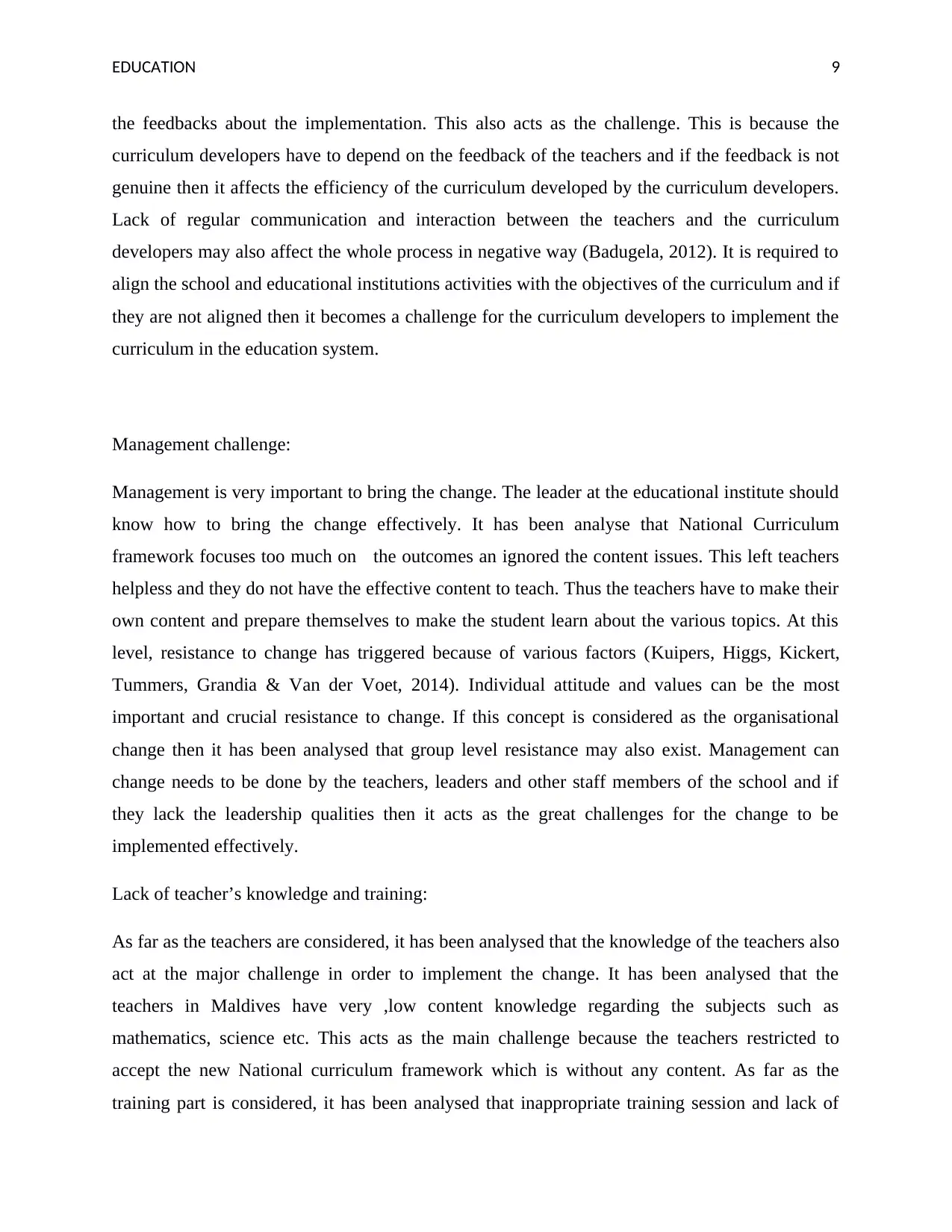
EDUCATION 9
the feedbacks about the implementation. This also acts as the challenge. This is because the
curriculum developers have to depend on the feedback of the teachers and if the feedback is not
genuine then it affects the efficiency of the curriculum developed by the curriculum developers.
Lack of regular communication and interaction between the teachers and the curriculum
developers may also affect the whole process in negative way (Badugela, 2012). It is required to
align the school and educational institutions activities with the objectives of the curriculum and if
they are not aligned then it becomes a challenge for the curriculum developers to implement the
curriculum in the education system.
Management challenge:
Management is very important to bring the change. The leader at the educational institute should
know how to bring the change effectively. It has been analyse that National Curriculum
framework focuses too much on the outcomes an ignored the content issues. This left teachers
helpless and they do not have the effective content to teach. Thus the teachers have to make their
own content and prepare themselves to make the student learn about the various topics. At this
level, resistance to change has triggered because of various factors (Kuipers, Higgs, Kickert,
Tummers, Grandia & Van der Voet, 2014). Individual attitude and values can be the most
important and crucial resistance to change. If this concept is considered as the organisational
change then it has been analysed that group level resistance may also exist. Management can
change needs to be done by the teachers, leaders and other staff members of the school and if
they lack the leadership qualities then it acts as the great challenges for the change to be
implemented effectively.
Lack of teacher’s knowledge and training:
As far as the teachers are considered, it has been analysed that the knowledge of the teachers also
act at the major challenge in order to implement the change. It has been analysed that the
teachers in Maldives have very ,low content knowledge regarding the subjects such as
mathematics, science etc. This acts as the main challenge because the teachers restricted to
accept the new National curriculum framework which is without any content. As far as the
training part is considered, it has been analysed that inappropriate training session and lack of
the feedbacks about the implementation. This also acts as the challenge. This is because the
curriculum developers have to depend on the feedback of the teachers and if the feedback is not
genuine then it affects the efficiency of the curriculum developed by the curriculum developers.
Lack of regular communication and interaction between the teachers and the curriculum
developers may also affect the whole process in negative way (Badugela, 2012). It is required to
align the school and educational institutions activities with the objectives of the curriculum and if
they are not aligned then it becomes a challenge for the curriculum developers to implement the
curriculum in the education system.
Management challenge:
Management is very important to bring the change. The leader at the educational institute should
know how to bring the change effectively. It has been analyse that National Curriculum
framework focuses too much on the outcomes an ignored the content issues. This left teachers
helpless and they do not have the effective content to teach. Thus the teachers have to make their
own content and prepare themselves to make the student learn about the various topics. At this
level, resistance to change has triggered because of various factors (Kuipers, Higgs, Kickert,
Tummers, Grandia & Van der Voet, 2014). Individual attitude and values can be the most
important and crucial resistance to change. If this concept is considered as the organisational
change then it has been analysed that group level resistance may also exist. Management can
change needs to be done by the teachers, leaders and other staff members of the school and if
they lack the leadership qualities then it acts as the great challenges for the change to be
implemented effectively.
Lack of teacher’s knowledge and training:
As far as the teachers are considered, it has been analysed that the knowledge of the teachers also
act at the major challenge in order to implement the change. It has been analysed that the
teachers in Maldives have very ,low content knowledge regarding the subjects such as
mathematics, science etc. This acts as the main challenge because the teachers restricted to
accept the new National curriculum framework which is without any content. As far as the
training part is considered, it has been analysed that inappropriate training session and lack of
Paraphrase This Document
Need a fresh take? Get an instant paraphrase of this document with our AI Paraphraser
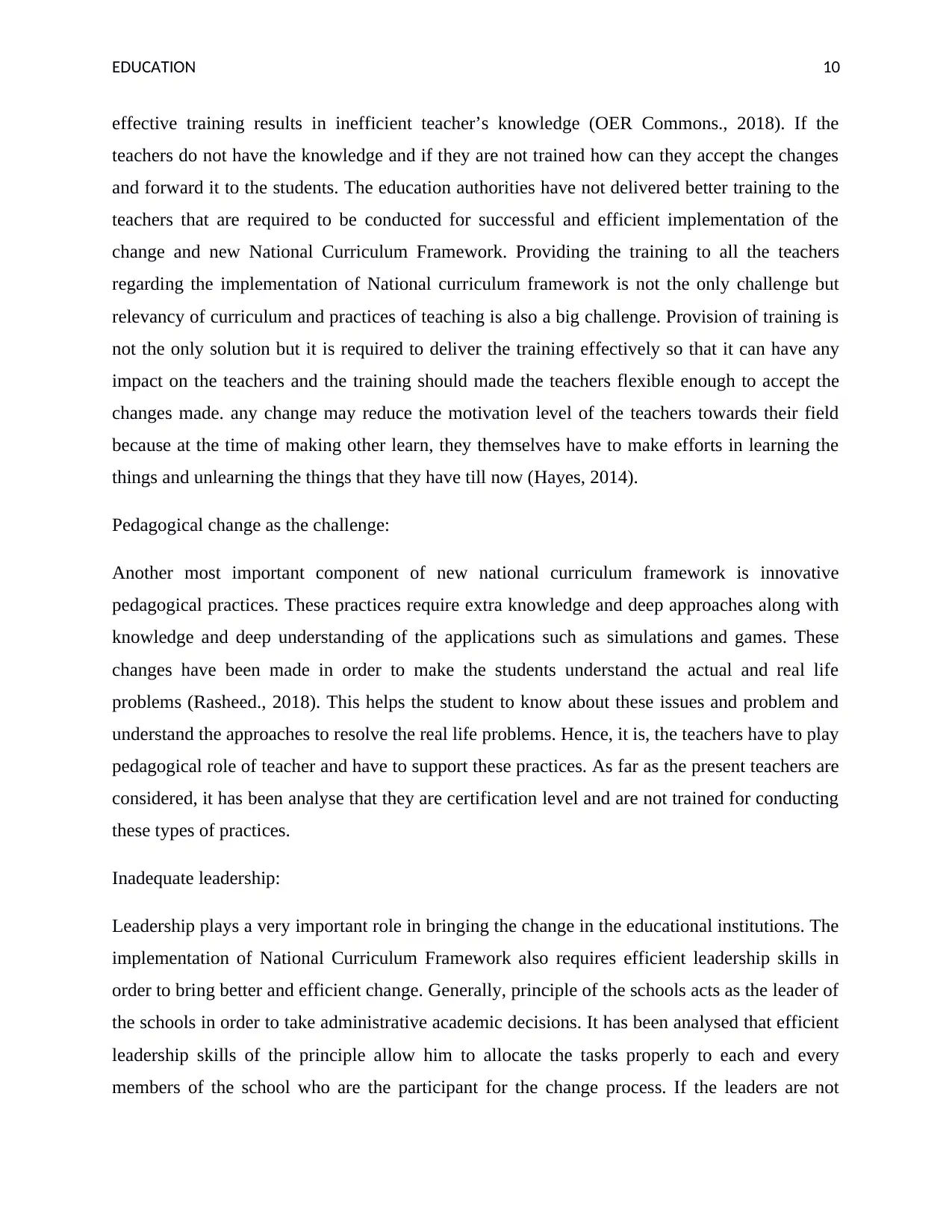
EDUCATION 10
effective training results in inefficient teacher’s knowledge (OER Commons., 2018). If the
teachers do not have the knowledge and if they are not trained how can they accept the changes
and forward it to the students. The education authorities have not delivered better training to the
teachers that are required to be conducted for successful and efficient implementation of the
change and new National Curriculum Framework. Providing the training to all the teachers
regarding the implementation of National curriculum framework is not the only challenge but
relevancy of curriculum and practices of teaching is also a big challenge. Provision of training is
not the only solution but it is required to deliver the training effectively so that it can have any
impact on the teachers and the training should made the teachers flexible enough to accept the
changes made. any change may reduce the motivation level of the teachers towards their field
because at the time of making other learn, they themselves have to make efforts in learning the
things and unlearning the things that they have till now (Hayes, 2014).
Pedagogical change as the challenge:
Another most important component of new national curriculum framework is innovative
pedagogical practices. These practices require extra knowledge and deep approaches along with
knowledge and deep understanding of the applications such as simulations and games. These
changes have been made in order to make the students understand the actual and real life
problems (Rasheed., 2018). This helps the student to know about these issues and problem and
understand the approaches to resolve the real life problems. Hence, it is, the teachers have to play
pedagogical role of teacher and have to support these practices. As far as the present teachers are
considered, it has been analyse that they are certification level and are not trained for conducting
these types of practices.
Inadequate leadership:
Leadership plays a very important role in bringing the change in the educational institutions. The
implementation of National Curriculum Framework also requires efficient leadership skills in
order to bring better and efficient change. Generally, principle of the schools acts as the leader of
the schools in order to take administrative academic decisions. It has been analysed that efficient
leadership skills of the principle allow him to allocate the tasks properly to each and every
members of the school who are the participant for the change process. If the leaders are not
effective training results in inefficient teacher’s knowledge (OER Commons., 2018). If the
teachers do not have the knowledge and if they are not trained how can they accept the changes
and forward it to the students. The education authorities have not delivered better training to the
teachers that are required to be conducted for successful and efficient implementation of the
change and new National Curriculum Framework. Providing the training to all the teachers
regarding the implementation of National curriculum framework is not the only challenge but
relevancy of curriculum and practices of teaching is also a big challenge. Provision of training is
not the only solution but it is required to deliver the training effectively so that it can have any
impact on the teachers and the training should made the teachers flexible enough to accept the
changes made. any change may reduce the motivation level of the teachers towards their field
because at the time of making other learn, they themselves have to make efforts in learning the
things and unlearning the things that they have till now (Hayes, 2014).
Pedagogical change as the challenge:
Another most important component of new national curriculum framework is innovative
pedagogical practices. These practices require extra knowledge and deep approaches along with
knowledge and deep understanding of the applications such as simulations and games. These
changes have been made in order to make the students understand the actual and real life
problems (Rasheed., 2018). This helps the student to know about these issues and problem and
understand the approaches to resolve the real life problems. Hence, it is, the teachers have to play
pedagogical role of teacher and have to support these practices. As far as the present teachers are
considered, it has been analyse that they are certification level and are not trained for conducting
these types of practices.
Inadequate leadership:
Leadership plays a very important role in bringing the change in the educational institutions. The
implementation of National Curriculum Framework also requires efficient leadership skills in
order to bring better and efficient change. Generally, principle of the schools acts as the leader of
the schools in order to take administrative academic decisions. It has been analysed that efficient
leadership skills of the principle allow him to allocate the tasks properly to each and every
members of the school who are the participant for the change process. If the leaders are not
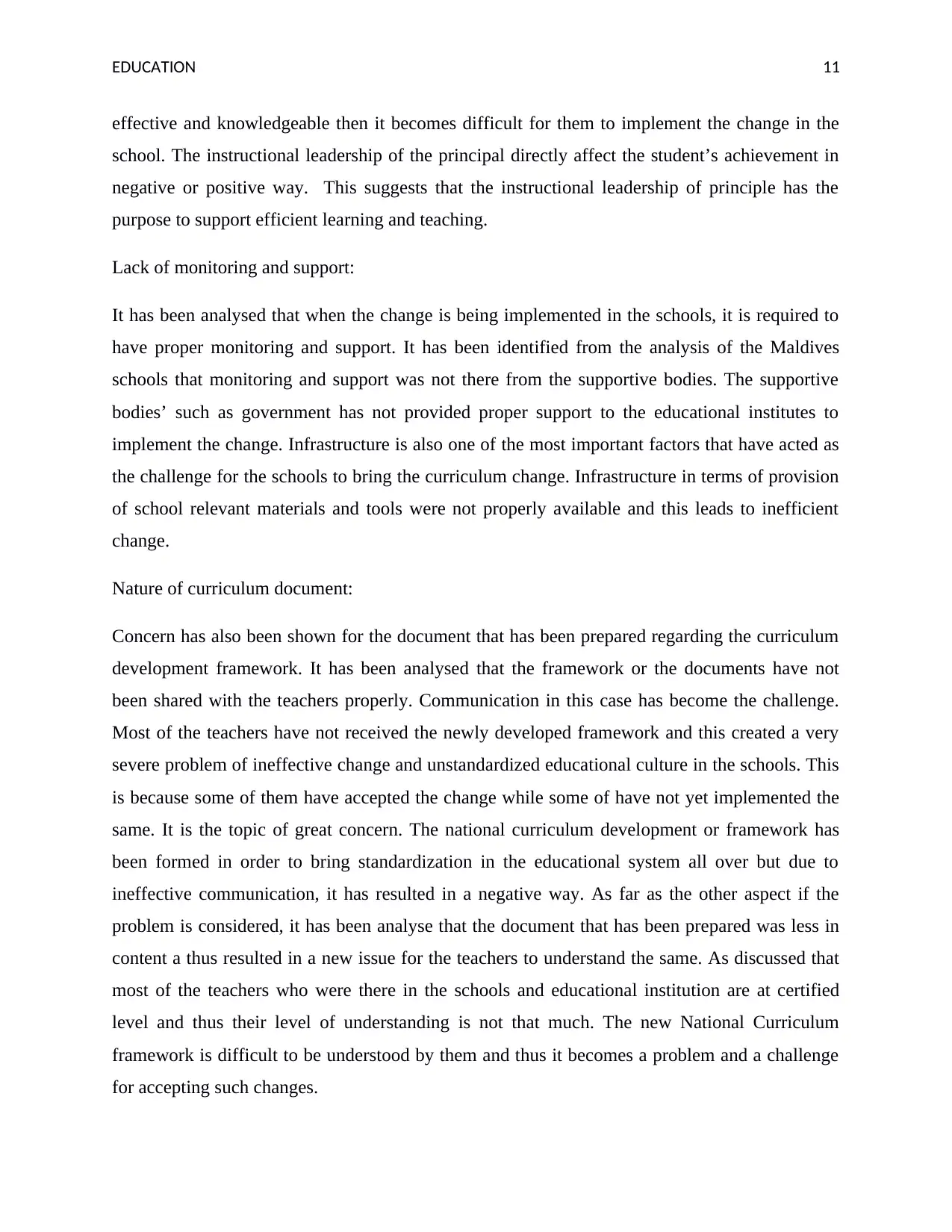
EDUCATION 11
effective and knowledgeable then it becomes difficult for them to implement the change in the
school. The instructional leadership of the principal directly affect the student’s achievement in
negative or positive way. This suggests that the instructional leadership of principle has the
purpose to support efficient learning and teaching.
Lack of monitoring and support:
It has been analysed that when the change is being implemented in the schools, it is required to
have proper monitoring and support. It has been identified from the analysis of the Maldives
schools that monitoring and support was not there from the supportive bodies. The supportive
bodies’ such as government has not provided proper support to the educational institutes to
implement the change. Infrastructure is also one of the most important factors that have acted as
the challenge for the schools to bring the curriculum change. Infrastructure in terms of provision
of school relevant materials and tools were not properly available and this leads to inefficient
change.
Nature of curriculum document:
Concern has also been shown for the document that has been prepared regarding the curriculum
development framework. It has been analysed that the framework or the documents have not
been shared with the teachers properly. Communication in this case has become the challenge.
Most of the teachers have not received the newly developed framework and this created a very
severe problem of ineffective change and unstandardized educational culture in the schools. This
is because some of them have accepted the change while some of have not yet implemented the
same. It is the topic of great concern. The national curriculum development or framework has
been formed in order to bring standardization in the educational system all over but due to
ineffective communication, it has resulted in a negative way. As far as the other aspect if the
problem is considered, it has been analyse that the document that has been prepared was less in
content a thus resulted in a new issue for the teachers to understand the same. As discussed that
most of the teachers who were there in the schools and educational institution are at certified
level and thus their level of understanding is not that much. The new National Curriculum
framework is difficult to be understood by them and thus it becomes a problem and a challenge
for accepting such changes.
effective and knowledgeable then it becomes difficult for them to implement the change in the
school. The instructional leadership of the principal directly affect the student’s achievement in
negative or positive way. This suggests that the instructional leadership of principle has the
purpose to support efficient learning and teaching.
Lack of monitoring and support:
It has been analysed that when the change is being implemented in the schools, it is required to
have proper monitoring and support. It has been identified from the analysis of the Maldives
schools that monitoring and support was not there from the supportive bodies. The supportive
bodies’ such as government has not provided proper support to the educational institutes to
implement the change. Infrastructure is also one of the most important factors that have acted as
the challenge for the schools to bring the curriculum change. Infrastructure in terms of provision
of school relevant materials and tools were not properly available and this leads to inefficient
change.
Nature of curriculum document:
Concern has also been shown for the document that has been prepared regarding the curriculum
development framework. It has been analysed that the framework or the documents have not
been shared with the teachers properly. Communication in this case has become the challenge.
Most of the teachers have not received the newly developed framework and this created a very
severe problem of ineffective change and unstandardized educational culture in the schools. This
is because some of them have accepted the change while some of have not yet implemented the
same. It is the topic of great concern. The national curriculum development or framework has
been formed in order to bring standardization in the educational system all over but due to
ineffective communication, it has resulted in a negative way. As far as the other aspect if the
problem is considered, it has been analyse that the document that has been prepared was less in
content a thus resulted in a new issue for the teachers to understand the same. As discussed that
most of the teachers who were there in the schools and educational institution are at certified
level and thus their level of understanding is not that much. The new National Curriculum
framework is difficult to be understood by them and thus it becomes a problem and a challenge
for accepting such changes.
⊘ This is a preview!⊘
Do you want full access?
Subscribe today to unlock all pages.

Trusted by 1+ million students worldwide
1 out of 19
Related Documents
Your All-in-One AI-Powered Toolkit for Academic Success.
+13062052269
info@desklib.com
Available 24*7 on WhatsApp / Email
![[object Object]](/_next/static/media/star-bottom.7253800d.svg)
Unlock your academic potential
Copyright © 2020–2025 A2Z Services. All Rights Reserved. Developed and managed by ZUCOL.





